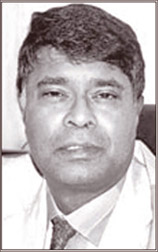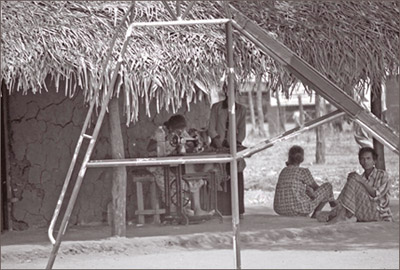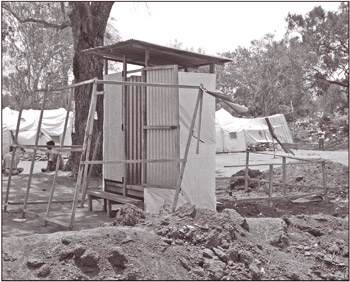Incompetence, wastage and perversity overcome at Menik Farm
Prof Rajiva Wijesinha, MP
|

Prof RAJIVA WIJESINHA, MP
|
As Secretary to the Ministry of Disaster Management and Human Rights,
which was responsible for coordinating humanitarian assistance in 2009,
I am astonished at the effrontery of the Darusman Panel. Perhaps the
biggest lie was the assertion that ‘Conditions in Menik Farm did improve
over time after much protest from the international community and
threats from donors to cut off funding.
On the contrary, conditions improved after we kept demanding better
use of the funds that had been collected on behalf of the Sri Lankan
people, but which were being squandered. The most obvious instance of
this was the manner various agencies constructed exploding toilets in
violation of national guidelines.
In checking on my correspondence at the time, I found many more
instances of efforts to ensure greater accountability. I thought it
might be useful therefore to go in detail into some of the allegations
made. I have also looked at what are termed protection concerns, and
will indicate how, from the very start it seemed, some people in the UN
were using funds allocated for this purpose, not to report on problems
so that they could be solved, but to stockpile allegations. Sometimes
this was in direct contradiction of what we were told on the record at
the time.
International organizations
The claims of the Panel are given in italics with the relevant
paragraph number, with my comments afterwards. Citations from letters
written at the time will be highlighted.
156. At Menik Farm, severe restrictions prevented international
organizations from doing protection work or speaking to the IDPs in
private. ICRC initially had access to Menik Farm for a short period, but
was soon excluded. The restrictions suggest an attempt by the Government
to prevent those who came out of the conflict zone from relaying their
experiences to international agencies and NGOs.
|

Houses built for IDPs |
The absence of external and independent monitoring also increased the
vulnerability of IDPs to violations in the camp, including exposure of
women without male relatives and unaccompanied children to sexual and
other forms of violence. 89 In the chaos of the early days, some zones
were established before the barbed wire was erected, allowing some
people to leave the camp. 90 Landmines were removed by the SLA outside
of the public eye, in a process that may have resulted in the
destruction of evidence.
Monitoring work
The restriction made sense, because government knew the utter failure
of agencies that had claimed to do protection work but had allowed the
people of the Vanni to be ruthlessly abused in the past. The general
view in which they were held became clear when a couple of youngsters
were questioned who had not gone back when universities had started, but
had been hidden by their parents to avoid conscription. When asked why
they had not appealed to UN or NGO officials, they said that they did
nothing to help.
It should be noted that what was termed protection had been consuming
funds with no liaison with government, and it took some months for the
UNHCR officer responsible for protection to share with government the
regular reports of the many agencies involved in protection. This would
have seemed a basic requirement if the purpose of all this funding was
to ensure remedies for those adversely affected, rather than to fun
friends or else for other purposes.
The incompetence of the agencies involved can be seen in the failure
to provide answers to the many queries raised during the period in which
the reports were supplied, often outrageously late, suggesting that
UNHCR did not take seriously its responsibility of monitoring work in
this area. Conversely the approach of some UNHCR officials suggested
another agenda, as I pointed out repeatedly to Elizabeth Tan, who was
supposed to be in charge of Protection, and even to her boss, Michael
Zwack.
‘I wrote yesterday to Elizabeth about the amateur nature of the
reports and explanations we are receiving with regard to Protection
concerns. We recognize that there are problems and we need to work
together to resolve these.
However, whilst I am sure this is the aim of most UN staff, I
continue shocked by what seems the agenda, doubtless of just a few, of
engaging in relentless criticism of the Sri Lankan government without
any sense of honesty and transparency. The contradictory statements we
are getting about responsibility for yet another harsh critique to the
UN Security Council seems just the tip of a very nasty iceberg.
Since UNHCR is supposed to be the lead agency on Protection issues, I
hope you will assist us to get to the root of all this (assuming
icebergs can have roots), and ensure that positive work for the future
is not continuously being stymied. ‘The letter to Elizabeth Tan is given
as an annexe to this article, as is yet another instance of hysteria,
which I reported to the Head of UNHCR on December 28, again receiving no
reply as to the markings in the background.
Sexual violence
|

Toilet facilities provided by UN Agency |
The last statement above in the Darusman Panel report is also
tendentious, especially when there is no allegation elsewhere in the
report about sexual or other violence used against children.
There are no allegations too about sexual violence with regard to
women in the camps, nor any other violence with regard to women in
particular, and the general claims about sexual abuse are thin and
unsubstantiated.
157. Prior to the establishment of Menik Farm, international
agencies, including the International Organization for Migration (IOM),
UNHCR, UNICEF and others, debated amongst themselves about conditioning
their provision of humanitarian assistance on the Government’s meeting
international standards with regard to the camps. Several communications
on the applicable standards were sent to the Sri Lankan Government by
agencies, such as UNHCR, and by NGOs. However, when IDPs came out in
larger numbers, the international agencies failed to take a common
position on the pre-conditions. Many international agencies continued to
provide assistance, in spite of the dramatically sub-standard conditions
that prevailed at Menik Farm.
This misrepresents the situation. The government had been asking for
good conditions for the displaced, most notably at a planning meeting
held on January 29, 2009 at the Intercontinental Hotel.
The communications, and the pronouncements, mainly from NGOs, were on
the closed nature of the camps, whereas in this respect Government
believed it was acting within the guiding principles, given the grace
security situation.
It was to check on this and on what alleviatory measures should be
taken that the Government engaged so actively with Prof Kalin, whereas
some NGOs were unwilling to considered security concerns and were
agitating for measures that would have replicated the unfortunately
situation of the past, which had led to several displaced persons being
badly treated and not considered for resettlement or return for decades.
Ensure accountability
The manner in which government had to agitate to improve the
sub-standard conditions, in spite of the large amounts of funding
available, will be detailed elsewhere. Here let me just draw attention
to my letter at Annexe 3 to the Head of what was supposed to be the
Office for the Coordination of Humanitarian Affairs, which did not seem
to understand what coordination meant. It should be noted though that,
as I said in an earlier letter of October 16, there had been some
improvement from previous years, in which the LTTE seemed to have made
hay - and bought guns with funds intended for humanitarian purposes -
Dear Zola ....It was felt that, as we have discussed earlier, there
has been insufficient transparency with regard to the CHAP in the past.
There may have been reasons for this, but we need to ensure at least
proper sharing of information regarding the current CHAP and due
consultation so as to respond helpfully to any sudden needs that may
arise. We also need to ensure full consultation for the 2010 CHAP, and
mechanisms to ensure accountability and the necessary flexibility to
deal with unexpected situations.
...It will also be essential to ensure value for money, and I would
therefore urge limits on overheads that will unnecessarily limit funds
available for actual support to the displaced. Please discuss all
proposals with line ministries before incorporating them in any initial
drafts, and ensure benefits to the actual targets for assistance to the
greatest possible extent. I should note that, despite some worries,
there was appreciation of the improvement in administration and
accountability of the CHAP this year, and I hope very much that we will
be able to produce even better results in 2010. It was good that, with
CHAP assistance, we were able to provide comparatively good services and
support to the large quantities of displaced, and I hope very much that,
with the funds and materials that still remain we shall ensure minimum
discomfort to them during the next few months before they can all be
resettled.
158. The detention of the IDP population lasted for months or in some
cases, years.
By December 2009, around 149,000 IDPs had been released, with another
135,000 remaining in the camps. By September 2010, the Government said
it had released 242,741 IDPs, with 25,795 still waiting to be released.
To be continued
|



